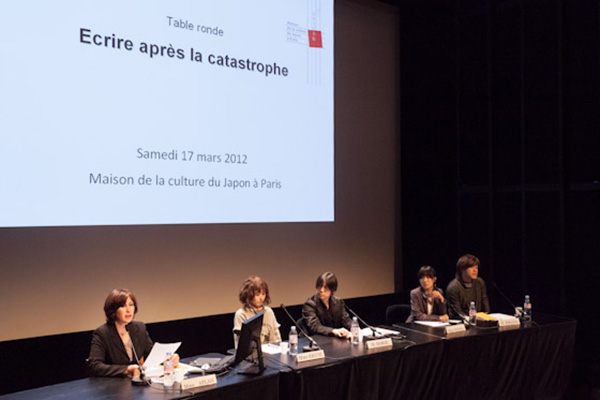Writing after 3/11: Kaori Ekuni, Keiichiro Hirano, Toshiyuki Horie, Risa Wataya
Koichi Makise
The Japan Cultural Institute in Paris
How did the March 11, 2011, earthquake and tsunami in eastern Japan change the act of writing? What new sensibilities and awareness did the catastrophe kindle in authors?
The Japan Cultural Institute in Paris as part of the special cultural program for disaster recovery "Overcoming the Disaster--Gratitude from Japan to the World" organized a round-table discussion with four Japanese authors on March 17, 2012, titled "Changes in Japanese Literature after 3.11."
The session invited as panelists Kaori Ekuni, Keiichiro Hirano, Toshiyuki Horie, and Risa Wataya, who were guests at the largest exhibition of books in France, the Paris Book Fair between March 16 and 19. Translator and novelist Corinne Atlan served as the moderator.
This article introduces excerpts of the two-hour discussion, highlighting some of the most impressive quotes from the authors with a focus on the themes "3/11" and "words."
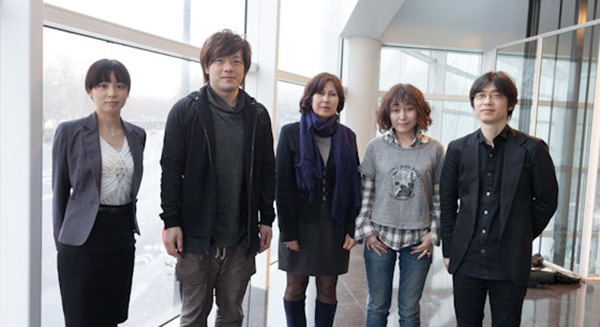
From left: Risa Wataya, Keiichiro Hirano, Corinne Atlan, Kaori Ekuni, and Toshiyuki Horie
3/11 and the act of writing
At the moment the earthquake and tsunami struck, the four authors were in different places doing different things. The first question was on how each faced the situation afterward: whether to write or not to write about the disaster.
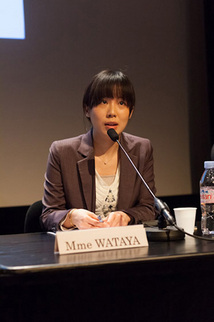 "I was finishing up a manuscript and debated heavily on whether or not to include the passage 'I extend my sympathy to those who have suffered from the disaster.' My editor suggested that not everyone thinks it's necessary. And yet I decided it was the correct thing to do. Looking back now, I'm still not sure I was right. But at the time, I felt it was inevitable; it had to be done. The message appears in the afterword of the published book." (Risa Wataya)
"I was finishing up a manuscript and debated heavily on whether or not to include the passage 'I extend my sympathy to those who have suffered from the disaster.' My editor suggested that not everyone thinks it's necessary. And yet I decided it was the correct thing to do. Looking back now, I'm still not sure I was right. But at the time, I felt it was inevitable; it had to be done. The message appears in the afterword of the published book." (Risa Wataya)
"I wrote in the broadest range of media after 3/11. Partly because in the hours immediately after the disaster, when all phone lines were down, I found that by some miracle only Twitter worked . . . And so [through Twitter] I decided to simply keep on writing what I felt, what I thought, anything that came to mind at the given moment. I distinguished these outpourings from the level of wording I aimed for in novels. The words I used here were disposable; they didn't need to make a lasting impression. All that mattered was that I kept on writing." (Keiichiro Hirano)
3/11 and its influence on literature
Citing the impact of the war and the atomic bombings on postwar Japanese literature, Atlan asked the authors what influence 3/11 might have on Japanese literature. Horie, alluding to the diverse definitions of words like "influence" and "theme," had this to say.
". . .Even if you don't write about an event in the concrete, as long as you're writing, the essence of your words always connect with the world outside. The same words can make the air around you sway in a different direction from day to day. I write because I want to grasp the changes in the air between today and tomorrow. At the site of an air raid, an earthquake, a tsunami, a nuclear meltdown, the people there have something tangible to fight against. But I suspect the air warps for people in the periphery, too, perhaps in an even more distinct, more frightening way. In that sense, at a basic level, it's impractical to dictate who is directly or indirectly linked to an event. If you're a writer, then no matter what you write about, you can't help forming a direct link." (Toshiyuki Horie)
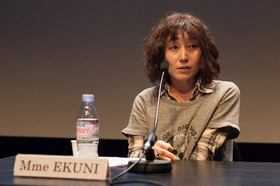 "In time, I think an answer will emerge to the question on whether it's possible to compare postwar literature to post-3/11 literature. But only if, in time, an author emerges who transforms 3/11 into literature. As Mr. Hirano says, we haven't yet seen the full damage of 3/11. It's going to take a long time before we reach any conclusion. And even then, any attempt to compare the aftermaths of the two events may be pointless. I hope that when an author does emerge who transforms 3/11 into literature, that author has more freedom than authors of postwar literature. Hopefully, a narrative story, by definition, can allow room for creativity, whether the subject is war, or disease, or love, or family. Otherwise, it isn't literature." (Kaori Ekuni)
"In time, I think an answer will emerge to the question on whether it's possible to compare postwar literature to post-3/11 literature. But only if, in time, an author emerges who transforms 3/11 into literature. As Mr. Hirano says, we haven't yet seen the full damage of 3/11. It's going to take a long time before we reach any conclusion. And even then, any attempt to compare the aftermaths of the two events may be pointless. I hope that when an author does emerge who transforms 3/11 into literature, that author has more freedom than authors of postwar literature. Hopefully, a narrative story, by definition, can allow room for creativity, whether the subject is war, or disease, or love, or family. Otherwise, it isn't literature." (Kaori Ekuni)
Words in Japanese and the trouble with translations
The Japanese language, and thus Japanese literature, is singular in nature. How do authors feel about their work being translated into other languages? Do they take into account a foreign readership when penning their thoughts?
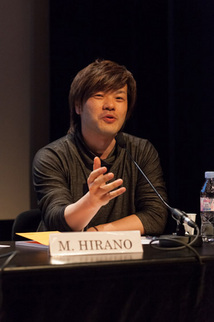 "I live in Japan and write novels in Japan. Naturally, my first audience is Japanese readers. At the same time, though, I do wish to reach a wider, global readership. The drawback is that all the mannerisms and elaborate expressions that work in Japanese, the effects of craftsmanship risk being lost in translation . . . And yet I'm a writer of novels in the Japanese language. I'll forever strive to build my style in Japanese, perhaps always knowing that the style may be lost in another language, and perhaps never being able to do anything about it." (Keiichiro Hirano)
"I live in Japan and write novels in Japan. Naturally, my first audience is Japanese readers. At the same time, though, I do wish to reach a wider, global readership. The drawback is that all the mannerisms and elaborate expressions that work in Japanese, the effects of craftsmanship risk being lost in translation . . . And yet I'm a writer of novels in the Japanese language. I'll forever strive to build my style in Japanese, perhaps always knowing that the style may be lost in another language, and perhaps never being able to do anything about it." (Keiichiro Hirano)
"I also want my work to reach people in many countries. In fact, although I write in Japan in the Japanese language, I don't write with a specific audience in mind. But the fact remains that I write in Japanese. And to me, the events that unfold in the novel aren't nearly as important as how I word them. I'd even go as far as to say my novel is no longer my novel unless it's read in my Japanese." (Kaori Ekuni)
"I like to craft my stories in a slippery way that might be interpreted differently even from one Japanese reader to the next. When that's translated into another language, it risks being even more ambiguous. It's a cause for great distress . . . But if you compare old and new translations of, say, Dostoevsky, both are good even though the wording is completely different. Both can tell an eloquent story. There may be a couple of mistranslations, yes, but you're ready to dismiss them because the story is so good. My ideal would be to tap into this sort of universal sentiment." (Risa Wataya)
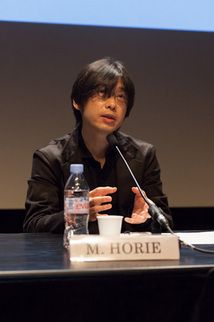 "I write in Japanese, so my first target is a Japanese readership. I never calculate from the start how the words might be converted into another language. I'd be happy if someone warmed up to the Japanese language, just as I warmed up to the French language, and if that someone discovered my words. The study of languages starts with your mother tongue. I'm still in the process of studying mine--Japanese. I have a feeling there's more to learn, more I can do with it . . . Sometimes I feel the Japanese language needs to be looked at from the outside, and given a push forward. Since I'm a translator myself, I might be able to approach my own language from that angle." (Toshiyuki Horie)
"I write in Japanese, so my first target is a Japanese readership. I never calculate from the start how the words might be converted into another language. I'd be happy if someone warmed up to the Japanese language, just as I warmed up to the French language, and if that someone discovered my words. The study of languages starts with your mother tongue. I'm still in the process of studying mine--Japanese. I have a feeling there's more to learn, more I can do with it . . . Sometimes I feel the Japanese language needs to be looked at from the outside, and given a push forward. Since I'm a translator myself, I might be able to approach my own language from that angle." (Toshiyuki Horie)
The round-table discussion went on at times in a relaxed mood, at times with a sense of tension. In a span of two hours, it offered valuable hints as to the changes and movements in literature in Japan--this country faced with the brutal reality of an earthquake, tsunami, and nuclear accident.
An unabridged transcript of the round-table discussion "Changes in Japanese Literature after 3.11" was published in the June 2012 issue of Bungakukai magazine (Bungeishunju Ltd.).
Keywords
- Literature
- Language
- Natural Environment
- Japan
- France
- Great East Japan Earthquake
- Writers
- The Japan Cultural Institute in Paris
- Paris Book Fair
- Salon du Livre
- Kaori Ekuni
- Keiichiro Hirano
- Toshiyuki Horie
- Risa Wataya
- Corinne Atlan
- Novels
- Japanese literature
- War
- Atomic bomb
- Nuclear accident
- Japanese language
- Dostoevsky
Back Issues
- 2025.9.30 The 51st Japan Found…
- 2025.9.30 The Japan Foundation…
- 2025.9.30 Bringing the World C…
- 2025.9.30 The 51st (2024) Japa…
- 2025.9.30 Japan Foundation Pri…
- 2024.5.24 The 50th Japan Found…
- 2024.3. 4 Movie Theaters aroun…
- 2023.4.10 The 49th Japan Found…
- 2023.3.28 JF's Initiatives for…
- 2023.1.27 Living Together with…


